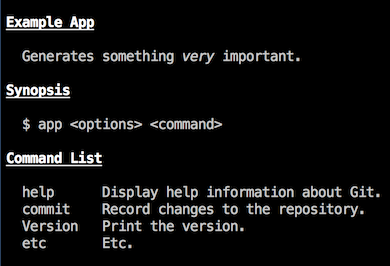Add a git-like command interface to your app.
command-line-commands
A lightweight module to help build a git-like command interface for your app.
Its job is to extract the command (the first argument, unless it’s an option), check it’s valid and either return it or throw. From there, you can parse the remaining args using your preferred option parser (e.g. command-line-args, minimist etc.).
Synopsis
Create a list of valid commands (null represents “no command”). Supply it to commandLineCommands(), receiving back an object with two properties: command (the supplied command) and argv (the remainder of the command line args):
const commandLineCommands = require('command-line-commands')
const validCommands = [ null, 'clean', 'update', 'install' ]
const { command, argv } = commandLineCommands(validCommands)
/* print the command and remaining command-line args */
console.log('command: %s', command)
console.log('argv: %s', JSON.stringify(argv))
We’ll assume the above script is installed as example. Since the validCommands list includes null, running it without a command is valid:
$ example
command: null
argv: []
Running example with no command and one option:
$ example --verbose
command: null
argv: ["--verbose"]
Running example with both a command and an option:
$ example install --save something
command: install
argv: ["--save","something"]
Running example without a valid command will cause commandLineCommands() to throw.
From here, you can make a decision how to proceed based on the command and argv received. For example, if no command (null) was passed, you could parse the remaining argv for general options (in this case using command-line-args):
if (command === null) {
const commandLineArgs = require('command-line-args')
const optionDefinitions = [
{ name: 'version', type: Boolean }
]
// pass in the `argv` returned by `commandLineCommands()`
const options = commandLineArgs(optionDefinitions, { argv })
if (options.version) {
console.log('version 1.0.1')
}
}
The same example, using minimist:
if (command === null) {
const minimist = require('minimist')
// pass in the `argv` returned by `commandLineCommands()``
const options = minimist(argv)
if (options.version) {
console.log('version 1.0.1')
}
}
More examples
Both examples use command-line-args for option-parsing.
- Simple: A basic app with a couple of commands.
- Advanced: A more complete example, implementing part of the git command interface.
Usage guides
Usage guides can be generated by command-line-usage. Here is a simple example (code):

API Reference
Example
const commandLineCommands = require('command-line-commands')
commandLineCommands(commands, [argv]) ⇒ Object ⏏
Parses the argv value supplied (or process.argv by default), extracting and returning the command and remainder of argv. The command will be the first value in the argv array unless it is an option (e.g. --help).
Kind: Exported function
Throws:
INVALID_COMMAND- user supplied a command not specified incommands.
| Param | Type | Description |
|---|---|---|
| commands | string | Array.<string> |
One or more command strings, one of which the user must supply. Include null to represent “no command” (effectively making a command optional). |
| [argv] | Array.<string> |
An argv array, defaults to the global process.argv if not supplied. |
© 2015-25 Lloyd Brookes <[email protected]>. Documented by jsdoc-to-markdown.
